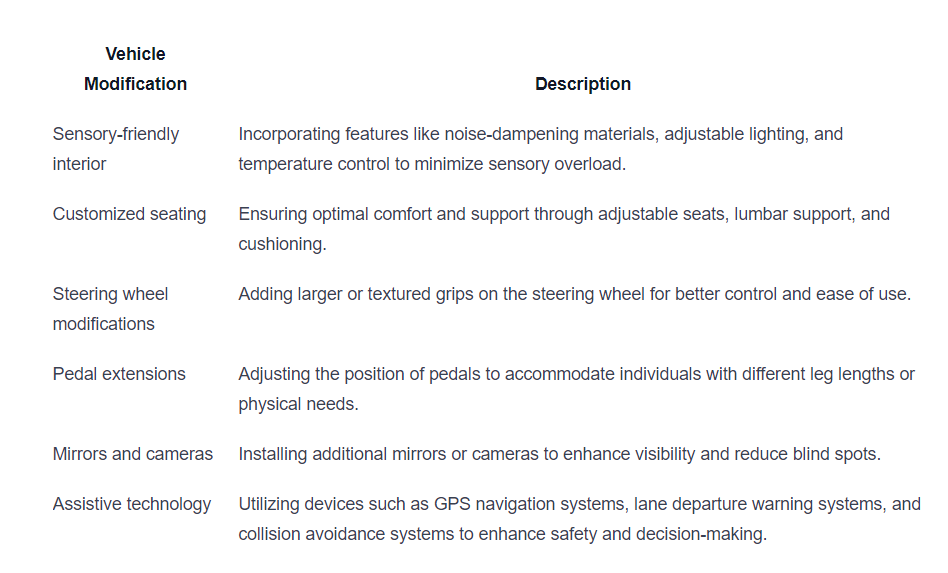Driving with Autism
For individuals on the autism spectrum, driving is a possibility after meeting the same licensing requirements as non-autistic individuals. Autistic people must pass the same tests and evaluations necessary to obtain a driver’s license in their state. However, it may take longer for some autistic individuals to obtain their driver’s license, with an average of 2 years for autistic adolescents according to one study.
Licensing Requirements
Autistic individuals are subject to the same licensing requirements as their non-autistic counterparts. They must successfully complete written exams, vision screenings, and road tests to demonstrate their driving abilities. The specific regulations surrounding licensing for autistic drivers may vary between jurisdictions, so it is essential for individuals and their families to familiarize themselves with the laws in their region.

Challenges Faced by Autistic Drivers
While many autistic individuals can drive safely and successfully, it’s important to recognize and address the challenges they may face on the road. Autism is a neurodevelopmental condition that affects social communication, behavior, and sensory processing. Some of the difficulties that autistic drivers may encounter include reduced motor skills and challenges with multitasking.
Each autistic individual is unique, and their driving abilities should be evaluated based on their specific skills, needs, and challenges, rather than making assumptions solely based on their diagnosis. Some regulatory authorities have acknowledged the need for alternative testing methods or accommodations to ensure a fair evaluation for autistic drivers.
It’s important to create an inclusive and supportive environment for autistic drivers by understanding and addressing their individual challenges. By doing so, we can ensure that autistic individuals have equal opportunities to exercise their independence and safely navigate the roads.
Strengths of Autistic Drivers
Autistic drivers possess certain strengths that contribute to their driving abilities. These strengths include their adherence to rules and their driving behavior, which ultimately contributes to their overall safety on the road.
Adherence to Rules
Autistic individuals often exhibit a strong adherence to rules, which can be advantageous in the context of driving. This adherence to rules extends to following traffic laws and regulations, resulting in a higher level of compliance with the driving process. As a result, young autistic individuals are less likely to receive traffic tickets and have their licenses suspended compared to other new drivers. The attention to detail and strict adherence to rules that many autistic individuals possess can contribute to a higher level of safety on the road.
Driving Behavior and Safety
In addition to their rule adherence, autistic drivers often exhibit driving behavior that prioritizes safety. Autistic individuals, known for their attention to detail, enjoy detailed planning, and thrive on consistency. These traits can contribute to becoming safer drivers as meticulous planning allows for predictability, alleviates anxiety, and fosters confidence in autistic drivers.
Furthermore, autistic individuals may possess cognitive abilities and decision-making skills that contribute to their driving skills. These abilities include attention to detail, strong memory recall, and adherence to rules. These traits can be advantageous for following traffic laws, maintaining focus, and remembering important information related to driving. This attention to detail and adherence to rules can contribute to the overall safety of autistic drivers on the road.
By recognizing and understanding the strengths of autistic drivers, we can support and create an inclusive environment that allows them to thrive on the road. These strengths, combined with appropriate licensing requirements, accommodations, and support systems, enable autistic individuals to engage in safe and successful driving experiences.
Enhancing Driving Skills
For autistic individuals who are interested in driving, there are ways to enhance their driving skills and ensure a comfortable and safe driving experience. By addressing specific challenges associated with autism and utilizing available resources, individuals can navigate the road with confidence. Two important aspects to consider are cognitive abilities and decision-making, as well as coping with sensory challenges.
Cognitive Abilities and Decision-Making
Autistic individuals may possess cognitive abilities and decision-making skills that can contribute to their driving skills. Traits such as attention to detail, adherence to rules, and strong memory recall can be advantageous for following traffic laws, maintaining focus, and remembering important information related to driving [2]. These traits can contribute to becoming safer drivers, as they prioritize accuracy and precision.
To further enhance cognitive abilities and decision-making skills, individuals can engage in activities that promote concentration, critical thinking, and problem-solving. These activities may include puzzles, memory games, and exercises that require attention to detail. Additionally, practicing decision-making scenarios related to driving can help individuals become more confident in making quick and appropriate choices on the road.
Coping with Sensory Challenges
Sensory challenges are common among autistic individuals and can impact their driving experience. Sensory sensitivities to noise, light, and touch may cause distraction or discomfort while driving. However, there are strategies and accommodations that can help individuals cope with these challenges.
One approach is to create a sensory-friendly driving environment. This can include using sunglasses or tinted windows to reduce glare, wearing noise-cancelling headphones or earplugs to minimize distracting sounds, and using seat covers or cushions for added comfort. Experimenting with different sensory adjustments can help individuals find what works best for them and promotes a calm and focused driving experience.
Furthermore, seeking professional guidance from occupational therapists or driving instructors experienced in working with individuals on the autism spectrum can provide valuable insights and strategies for managing sensory challenges while driving. They can provide personalized recommendations and techniques to help individuals navigate their sensory sensitivities effectively.
By focusing on cognitive abilities, decision-making skills, and coping mechanisms for sensory challenges, autistic individuals can enhance their driving skills and create a supportive driving environment. Seeking professional guidance, participating in driving programs tailored for autistic individuals, and utilizing assistive technology or vehicle modifications can further contribute to their success on the road. With the right support and accommodations, autistic individuals can confidently embrace the freedom and independence that driving can offer.
Support and Accommodations
When it comes to autistic individuals and driving, seeking professional guidance and utilizing appropriate support and accommodations are key to ensuring a safe and comfortable driving experience. By addressing specific challenges associated with autism, these measures can create a supportive driving environment. Two important aspects of support and accommodations for autistic drivers are seeking professional guidance and considering vehicle modifications.
Seeking Professional Guidance
For autistic individuals who are considering driving, seeking professional guidance is a crucial step. Collaborating with developmental pediatricians, occupational therapists, and physical therapists can provide valuable insights and assessments to determine readiness and address any neurodevelopmental and motor skill challenges in advance. These professionals can evaluate cognitive abilities, sensory processing skills, and other factors that may affect driving ability. Their expertise can help autistic individuals and their families make informed decisions and develop strategies to enhance driving skills.
Professional guidance can also involve participating in specialized driving programs or working with driving instructors who have experience with autistic individuals. These programs can provide tailored instruction, focusing on the specific needs and challenges of autistic drivers. Through personalized training and preparation, individuals can develop the necessary skills and confidence to navigate the road safely and responsibly.
Vehicle Modifications for Autistic Drivers
Vehicle modifications play a significant role in creating a driving environment that is tailored to the needs of autistic individuals. These modifications can address sensory sensitivities, improve comfort, and enhance overall safety while driving. Some common vehicle modifications for autistic drivers include:

By implementing these vehicle modifications, autistic drivers can optimize their driving experience and mitigate potential challenges they may face on the road. It’s essential to consult with professionals who specialize in vehicle modifications to ensure that the modifications are appropriate for the specific needs and preferences of the individual.
Support and accommodations, including seeking professional guidance and considering vehicle modifications, can empower autistic individuals to drive safely and confidently. With the right support system in place, autistic individuals can navigate the roads and enjoy the freedom and independence that driving can provide.
Readiness and Assessments
Before an autistic individual takes on the responsibility of driving, it is important to conduct individual evaluations and assessments to determine their readiness. Each person with autism is unique, and their abilities, skills, and needs should be evaluated on an individual basis, rather than making assumptions based on their diagnosis.
Individual Evaluations
During the assessment process for autistic individuals, various factors are taken into consideration to determine their readiness for driving. These factors may include cognitive abilities, sensory processing skills, motor skills, attention span, and executive functioning [4]. By thoroughly evaluating these areas, professionals can gain a comprehensive understanding of an individual’s capabilities and identify any specific challenges that may need to be addressed.
Collaboration with developmental pediatricians, occupational therapists, and physical therapists can be beneficial in addressing neurodevelopmental and motor skill challenges in advance. This collaborative approach helps create a strong foundation for driving practice and prepares individuals with autism for the road ahead [3].
Factors Affecting Driving Ability
Several factors can influence the driving ability of individuals with autism. These factors may include:
- Cognitive Abilities: Assessing cognitive skills such as attention, memory, problem-solving, and decision-making is crucial in determining an individual’s ability to handle the complexities of driving.
- Sensory Processing Skills: Evaluating how individuals process sensory information, such as visual, auditory, and tactile stimuli, is important as it can affect their ability to concentrate and react appropriately while driving.
- Motor Skills: Assessing fine and gross motor skills is essential in determining an individual’s ability to control the vehicle, including steering, braking, and accelerating.
- Attention Span: Evaluating an individual’s attention span and ability to maintain focus is crucial in ensuring safe and attentive driving.
- Executive Functioning: Assessing executive functioning skills, such as planning, organizing, and multitasking, is important as these skills play a vital role in managing various aspects of driving.
By considering these factors, professionals can gain insights into an individual’s driving readiness and identify any specific areas that may require additional support or accommodations. This comprehensive evaluation helps create a personalized approach to driving instruction and preparation for individuals with autism.
Through individual evaluations and assessments, professionals can determine the readiness of autistic individuals to take on the responsibility of driving. By recognizing their specific abilities, skills, and needs, a supportive and inclusive environment can be created to help them navigate the road safely.
Autistic Drivers’ Experiences
When it comes to driving, autistic individuals have unique experiences that may differ from their neurotypical peers. Understanding these experiences can shed light on how autism affects driving skills and what measures can be taken to support autistic drivers. Two key aspects to consider are the comparison between real-life driving and virtual simulations, as well as the importance of personalized training and preparation.
Real-Life Driving vs Virtual Simulations
Research on the driving behavior of autistic individuals has primarily relied on data collected through virtual driving technology rather than real-life driving courses. This has led to uncertainties about how autism specifically impacts driving skills. However, it is clear that individuals on the autism spectrum drive differently from their neurotypical peers [3].
Virtual simulations provide a controlled environment for assessing driving capabilities, allowing researchers to study specific aspects of driving behavior. While virtual simulations can be valuable tools for initial assessments, they may not fully capture the complexity and unpredictability of real-life driving situations.
Real-life driving experiences introduce additional factors such as traffic, road conditions, and interactions with other drivers. Autistic drivers may face challenges in adapting to these dynamic situations due to executive functioning difficulties commonly associated with autism. Therefore, it is important to consider both virtual simulations and real-life driving experiences when evaluating the driving skills of autistic individuals.
Personalized Training and Preparation
For autistic individuals, personalized training and preparation play a crucial role in achieving driving independence and safety. People on the autism spectrum often face challenges related to executive functioning, which can impact their ability to drive effectively [3]. However, with appropriate preparation, ample driving practice, and optimal learning settings, teens and young adults with autism can become proficient drivers.
Determining readiness is a vital step in deciding when individuals with autism are prepared to take their driver’s test. This process may begin years before they reach the legal driving age. Collaboration with developmental pediatricians, occupational therapists, and physical therapists can help address neurodevelopmental and motor skill challenges in advance, laying a strong foundation for driving practice.
Driving programs tailored for autistic students take into account their unique needs and preferred learning methods. These programs provide clear and concise instructions, allowing autistic individuals to learn at their own pace and in an environment that suits their learning style. Offering specialized training and support is essential for the success of autistic drivers, as it sets the stage for safe driving practices.
By considering the experiences of autistic drivers, we can recognize the importance of personalized training, preparation, and support. With the right guidance and opportunities, autistic individuals can develop the necessary skills to become safe and confident drivers, contributing to their independence and overall well-being.
References
- https://www.healthline.com/health/autism/can-autistic-people-drive
- https://www.abtaba.com/blog/autistic-people-can-drive
- https://www.autismparentingmagazine.com/can-autistic-people-drive/
- https://www.astraaba.com/blog/can-autistic-people-drive
- https://teendriversource.research.chop.edu/learning-to-drive/driving-with-neurodevelopmental-differences/autism-and-driving




